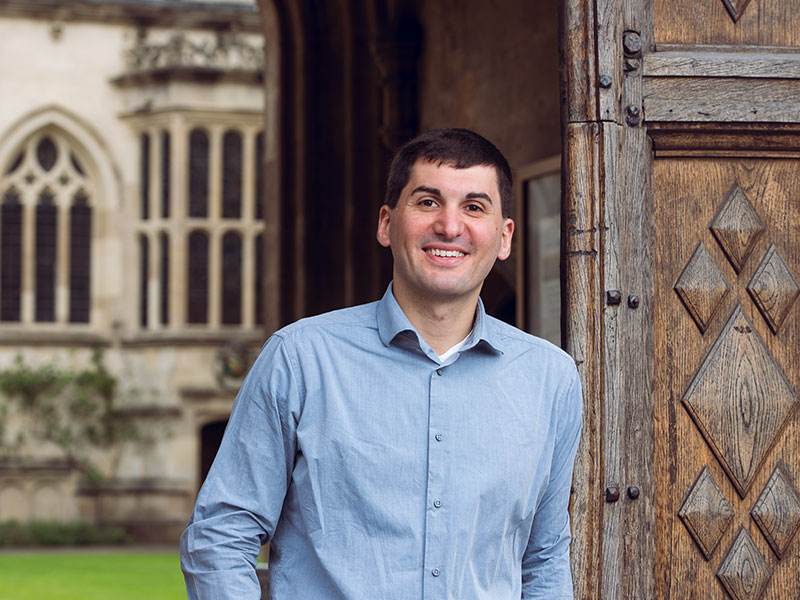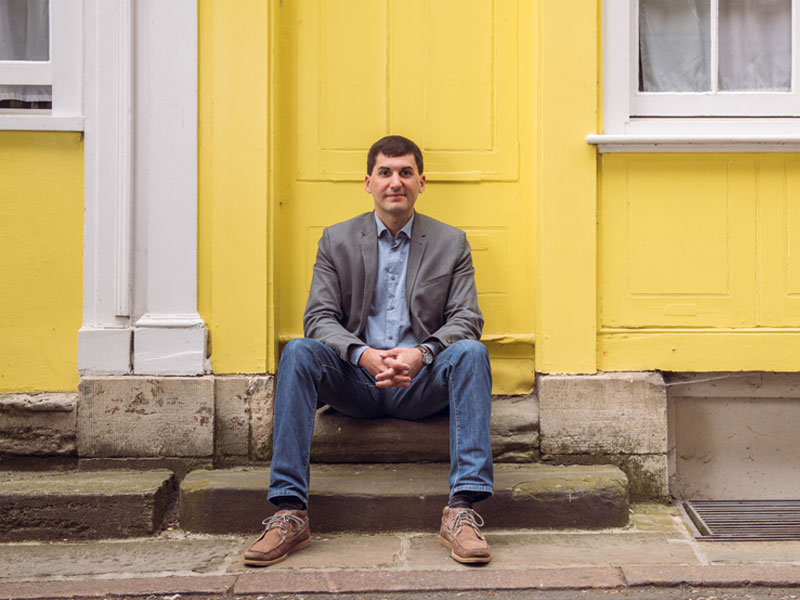Generous support from the Stavros Niarchos Foundation has helped to secure the future of an Associate Professorship and Fellowship in Ancient Greek Philosophy at Oriel College. Thanks to the endowment of this crucial post, Oxford has been able to expand and consolidate its world-leading expertise in ancient philosophy, helping to ensure that the study of this important field continues to flourish for years to come.
Dr Luca Castagnoli is fascinated with logic – or as some ancient Greeks called it, ta logika. 'It's really the study of logos; of argument or reasoning, in all its forms,' he explains. 'I'm particularly interested in the way in which the ancients reflected for the first time on what counts as a good or bad argument, and why. They believed that understanding this was essential, since you would then be able to apply this understanding in your own philosophical practice.'

Dr Castagnoli took up the position of Stavros Niarchos Foundation Clarendon Associate Professor and Fellow in Ancient Greek Philosophy at Oxford in 2015. As a tutorial fellow at Oriel College and member of the University's Faculty of Philosophy, his time is divided between teaching and pursuing his own research into ancient philosophy, especially logic and epistemology (the theory of knowledge). Within epistemology, he has a longstanding interest in ancient scepticism.
'The ancient sceptics,' he explains, 'thought that the correct use of reason would lead to the conclusion that any kind of knowledge should be disavowed.' He is especially interested in a form of ancient scepticism known as Pyrrhonism – named after the Greek philosopher Pyrrho. 'Their form of scepticism was extremely radical. They felt you really had no rational ground to believe anything at all; that you would lead a happier life if you suspended your beliefs about how things were, including your beliefs about values.'
Ancient Greek philosophy has a pervasive influence upon Western culture, but for those unfamiliar with the subject, its relevance to the modern world might not be immediately clear. 'That's the question: why go back all the way to the ancients?' muses Dr Castagnoli. 'Well, to be aware of the history of your discipline is of course important. But more significantly, there are ways in which thinking of ancient philosophical questions and arguments help you to appreciate the concepts and presuppositions that you yourself are adopting.' Dr Castagnoli's research is currently leading to a renewed appreciation of ancient logic.
It's a privilege to be able to teach students who are both highly motivated and intellectually very bright, and to see how they warm up to this way of thinking about philosophy.Dr Luca Castagnoli
Thanks to his appointment, engagement with ancient Greek logic and epistemology has become an even more important aspect of the philosophical curriculum at Oxford. And for Dr Castagnoli's students at Oriel, having a specialist in Hellenistic philosophy with whom they can interact from the very start has been extremely important. He explains: 'Having someone in college gives them the confidence of seeing another way you can do philosophy today, and how you can do it in conversation with the ancients.'
At his tutorials, ancient texts are examined and discussed as 'live pieces of philosophy', and students are encouraged to explore philosophical enquiry in a style imitating that of the ancients themselves. 'Philosophy is one of the disciplines for which the tutorial system at Oxford is ideally suited,' notes Dr Castagnoli. 'Since antiquity, philosophical schools and authors have been engaging in 'dialectic' conversation – ideas have been shaped by the constant interaction between different positions.'
That there is not one single-honour philosophy course for undergraduates at Oxford also lends itself well to this style of learning. Dr Castagnoli teaches students from a wide range of joint courses, in which philosophy is studied with modern languages, classics, physics, mathematics, computer science, economics, and politics. 'These students are brought together despite their different interests,' Dr Castagnoli explains. 'Their shared desire to study Greek philosophy means that there’s a cross-fertilisation of ideas, as well as an increased sense of community.'
Traditionally, Oxford and Oriel College have been home to some of the 20th-century's foremost ancient philosophy scholars. 'Not only does the endowment secure this tradition for the future,' explains Dr Castagnoli, 'but it means we will keep attracting undergraduate and graduate students who have an interest in this area, and inspire those already studying here to think of the inquiry into ancient philosophy as an important part of what they do.'

The Stavros Niarchos Foundation
Education is a cornerstone of the Stavros Niarchos Foundation (SNF)'s grant-making activity, with Classical and Hellenic Studies playing a key part. The endowment of this crucial post follows a long and fruitful collaboration with Oxford and a shared commitment to ensuring students of all disciplines are able to access teaching about ancient Greek philosophy in to the future. As well as supporting graduate scholarships, the Foundation has also contributed to the University's centre for classical and Byzantine studies.
The Stavros Niarchos Foundation is one of the world's leading private, international philanthropic organisations, making grants in the areas of arts and culture, education, health and sports, and social welfare. Since 1996, the SNF has committed more than $2.4 billion, through almost 4,000 grants to non-profit organisations in 113 nations around the world - including a new SNF initiative to expand its support of the health sector in Greece. The Foundation funds organisations and projects that are expected to achieve a broad, lasting and positive impact for society at large, and exhibit strong leadership and sound management.